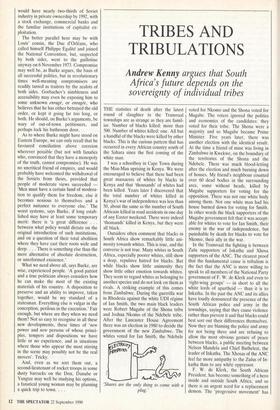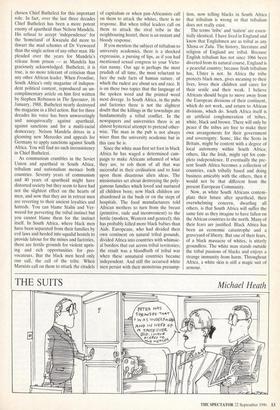TRIBES AND TRIBULATIONS
Andrew Kenny argues that South
Africa's future depends on the sovereignty of individual tribes
THE statistics of death after the latest round of slaughter in the Transvaal townships are as strange as they are famil- iar. Number of blacks killed: more than 500. Number of whites killed: one. All but a handful of the blacks were killed by other blacks. This is the curious pattern that has occurred in every African country south of the Sahara since the first coming of the white man.
I was a schoolboy in Cape Town during the Mau-Mau uprising in Kenya. We were encouraged to believe that there had been great massacres of whites by blacks in Kenya and that 'thousands' of whites had been killed. Years later I discovered that the total number of whites killed in Kenya's war of independence was less than 50, about the same as the number of South Africans killed in road accidents in one day of any Easter weekend. There were indeed 'thousands' killed in Kenya, but they were all black.
Outsiders often comment that blacks in South Africa show remarkably little ani- mosity towards whites. This is true, and the converse is not true. Many whites in South Africa, especially poorer whites, still show a deep, repulsive hatred for blacks. But while blacks show little animosity they show little other emotion towards whites. They seem to regard whites as belonging to another species and do not look on them as rivals. A striking example of this comes from Zimbabwe. During the guerrilla war in Rhodesia against the white UDI regime of Ian Smith, the two main black leaders were Robert Mugabe of the Shona tribe and Joshua Nkomo of the Ndebele tribe. After the Lancaster House Agreement there was an election in 1980 to decide the government of the new Zimbabwe. The whites voted for Ian Smith, the Ndebele 'Shares are the only thing to come with a plug.' voted for Nkomo and the Shona voted for Mugabe. The voters ignored the politics and economics of the candidates: they voted for their tribe. The Shona were a majority and so Mugabe became Prime Minister. Five years later, there was another election with the identical result. At the time a friend of mine was living in Zimbabwe in Kwekwe, on the boundary of the territories of the Shona and the Ndebele. There was much blood-letting after the election and much burning down of houses. My friend's neighbour counted over 60 dead bodies in the surrounding area, some without heads, killed by Mugabe supporters for voting for the opposition. There was not one white body among them. Not one white man had his house burned down for voting for Smith. In other words the black supporters of the Mugabe government felt that it was accept- able for whites to vote for Ian Smith, their enemy in the war of independence, but punishable by death for blacks to vote for Nkomo, their ally in the war.
In the Transvaal the fighting is between Zulu supporters of Inkatha and Xhosa supporters of the ANC. The clearest proof that the fundamental cause is tribalism is the fact that the ANC is more willing to speak to all members of the National Party government of F. W. de Klerk and even to `right-wing groups' — in short to all the white lords of apartheid — than it is to Inkatha. In the past the ANC and its allies have loudly denounced the presence of the South African police and army in the townships, saying that they cause violence rather than prevent it and that blacks could best sort out their differences themselves. Now they are blaming the police and army for not being there and are refusing to allow the most obvious gesture of peace between blacks, a public meeting between Nelson Mandela and Chief Buthelezi, the leader of Inkatha. The Xhosas of the ANC feel far more antipathy to the Zulus of In- katha than to any white oppressor.
F. W. de Klerk, the South African President, has become something of a hero inside and outside South Africa, and so there is an urgent need for a replacement demon. The 'progressive movement' has
chosen Chief Buthelezi for this important role. In fact, over the last three decades Chief Buthelezi has been a more potent enemy of apartheid than Nelson Mandela. His refusal to accept 'independence' for the 'homeland' of Kwazulu did more to thwart the mad schemes of Dr Verwoerd than the single action of any other man. He pleaded over the years for Mandela's release from prison — as Mandela has graciously acknowledged. Buthelezi, it is true, is no more tolerant of criticism than any other African leader. When Frontline, South Africa's only magazine of indepen- dent political content, reproduced an un- complimentary article on him first written by Stephen Robinson in The Spectator, 16 January, 1988, Buthelezi nearly destroyed the magazine in a libel action. But for three decades his voice has been unwaveringly and unequivocally against apartheid, against sanctions and for a multi-racial democracy. Nelson Mandela drives in a gleaming new Mercedes and appeals for Germany to apply sanctions against South Africa. You will find no such inconsistency in Chief Buthelezi.
As communism crumbles in the Soviet Union and apartheid in South Africa, tribalism and nationalism menace both countries. Seventy years of communism and 40 years of apartheid might have distorted society but they seem to have had not the slightest effect on the hearts of men, and now that they are in retreat men are reverting to their ancient loyalties and hatreds. You can blame Stalin and Ver- woerd for perverting the tribal instinct but you cannot blame them for the instinct itself. In South Africa, where black men have been separated from their families by evil laws and herded into squalid hostels to Provide labour for the mines and factories, there are fertile grounds for violent upris- ing and rich opportunities for pro- vocateurs. But the black men heed only one call, the call of the tribe. When Marxists call on them to attack the citadels of capitalism or when pan-Africanists call on them to attack the whites, there is no response. But when tribal leaders call on them to attack the rival tribe in the neighbouring hostel, there is an instant and bloody response.
If you mention the subject of tribalism to university academics, there is a shocked expression, a pursing of lips, as if you had mentioned sexual congress to your Victo- rian nanny. Our age is perhaps the most prudish of all time, the most reluctant to face the rude facts of human nature, of which the rudest are about sex and race. It is on these two topics that the language of the spoken word and the printed word most diverge. In South Africa, in the pubs and factories there is not the slightest doubt that the killings in the townships are fundamentally a tribal conflict. In the newspapers and universities there is an almost hysterical attempt to pretend other- wise. The man in the pub is not always wiser than the university academic but in this case he is.
Since the white man first set foot in black Africa he has waged a determined cam- paign to make Africans ashamed of what they are, to rob them of all that was successful in their civilisation and to foist upon them disastrous alien ideas. The missionaries set about destroying the poly- gamous families which loved and nurtured all children born; now black children are abandoned in the bush or on the steps of hospitals. The food manufacturers told African mothers to turn from the breast (primitive, rude and inconvenient) to the bottle (modern, Western and genteel); this has probably killed more black babies than Aids. Europeans, who had divided their own continent on natural tribal grounds, divided Africa into countries with whimsic- al borders that cut across tribal territories; the result was a bloodbath of tribal war when these unnatural countries became independent. And still the accursed white men persist with their monstrous presump- tion, now telling blacks in South Africa that tribalism is wrong or that tribalism does not really exist.
The terms 'tribe' and 'nation' are essen- tially identical. I have lived in England and know that Englishmen are as tribal as any Xhosa or Zulu. The history, literature and religion of England are tribal. Because English tribalism has not since 1066 been diverted from its natural course, England is a peaceful country; because Irish tribalism has, Ulster is not. In Africa the tribe protects black men, gives meaning to their lives, loves their children and cares for their senile and their weak. I believe Africans should begin to move away from the European divisions of their continent, which do not work, and return to African divisions, which do. South Africa itself is an artificial conglomeration of tribes, white, black and brown. There will only be peace if the tribes are free to make their own arrangements for their government and sovereignty. Some, like the Scots in Britain, might be content with a degree of local autonomy within South Africa; others, like the Irish, might opt for com- plete independence. If eventually the pre- sent South Africa becomes a collection of countries, each tribally based and doing business amicably with the others, then it would not be that different from the present European Community.
Now, as white South Africans contem- plate their future after apartheid, their overwhelming concern, dwarfing all others, is that South Africa will suffer the same fate as they imagine to have fallen on the African countries to the north. Many of their fears are justified. Black Africa has been an economic catastrophe and a graveyard of liberty. But one of their fears, of a black massacre of whites, is utterly groundless. The white man stands outside the tribal passions of blacks and enjoys a strange immunity from harm. Throughout Africa, a white skin is still a magic suit of armour.



































































 Previous page
Previous page